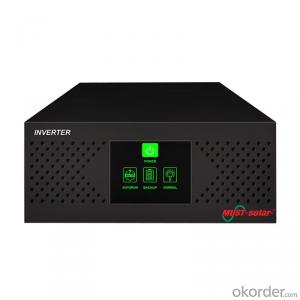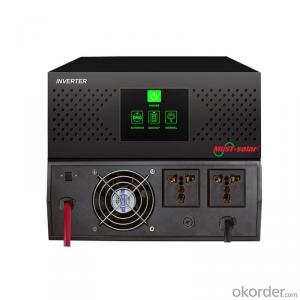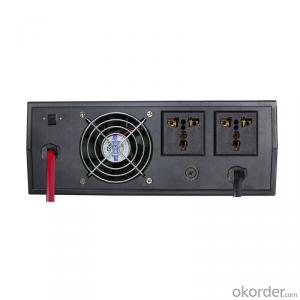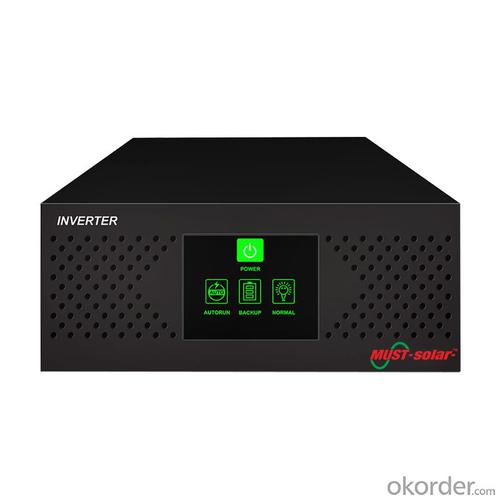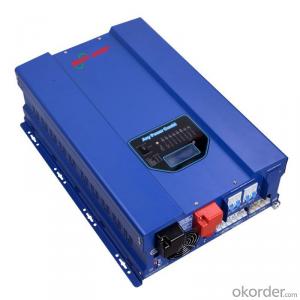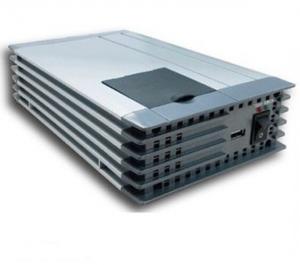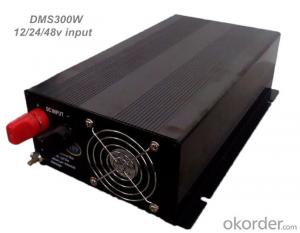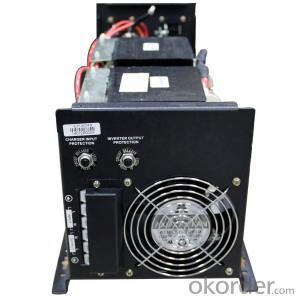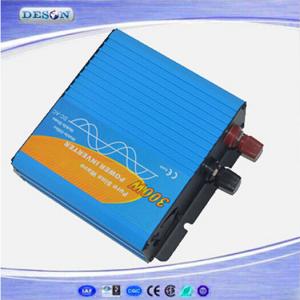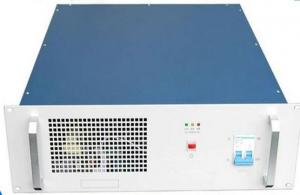Solar Inverter Fault Codes Low Frequency Pure Sine Wave Inverter EP2000 Series 300W/400W Reliable
- Loading Port:
- Ningbo
- Payment Terms:
- TT or LC
- Min Order Qty:
- 50 unit
- Supply Capability:
- 1000 unit/month
OKorder Service Pledge
OKorder Financial Service
You Might Also Like
South Africa EP1000 2000VA/1200W home solar power inverter made in China
The Specification of 2000VA/1200W home solar power inverter
EP modified sine wave inverter is a combination of an inverter and a charge. It offers a smart, convenient and economic way to get AC power supply from DC source for most electrical equipment. When the AC input is available, it will switch to AC power supply and starts charging on the batteries.
The PG series converts DC power into AC power. With a continuous output and compact design, the units is ideal for running TVs, Stereos, Laptop and computers and other home appliances .PG series will automatically transfer to inverter and provide power when AC supply is interrupted unexpectedly.
The Features of 2000VA/1200W home solar power inverter
Automatic line-to-battery switchover
Selectable input voltage ranges, power inverter has wide input range:90-280Vac narrow input range:170-280Vac
Small power inverter has high efficient DC-to-AC conversion, minimizing energy loss
Rack Tower design for flexible placement
Small power inverter built-in enhanced charger 8Amps for up to 100Ah battery
Intelligent 2-stage charger control for efficient charging and preventing overcharge
Overload protection
Auto restart while AC recovery
Multi-function LED indications and buzzer alarms
Small scale and cost effective inverter for home appliance and office equipment
LED indicator of power inverter for the battery mode, AC mode, battery charging mode, overload mode and fault warning
Over 95% efficiency in AC to AC mode
Audible alarm for the low battery, overload, overcharge and fault
Full protection of power inverter against deep discharge, overcharge, overload protection, short circuit, overvoltage and under voltage (compact power inverter)
*** 10A/ 20A charge current adjustable, LCD/ LED available power inverter EP1000 1000w 220vac solar inverter***
The Specifications of 2000VA/1200W home solar power inverter :
Rated Capacity | 500VA/300W | 1000VA/600W | 2000VA/1200W |
1.Input
Models | 120V Models | 230V Models | |
Nominal Voltage | 110V/115V/120V Selectable | 220V/230V/240V Selectable | |
Input Frequency | 47Hz ~ 65Hz, 50/60Hz Auto-Sensing | ||
Efficiency | 95%(Normal Mode) | ||
Noise Filtering | Full Time EMI/RFI Filtering | ||
Over Current Protection | By Re-Settable Over Current Protector | ||
Voltage Range | 90 - 145VAC Or 170-280VAC ( Narrow Range ) 50-145VAC / 90 280VAC (Wide Range) | ||
Surge Protection | 324 Joules | ||
2.Output
Rated Power | 500va/300w | 1000VA/600W | 2000VA/12000W | |
Output Voltage | 100V/110V/115V/120V Selectable | 200V/220V/230V/240v selectable | ||
Voltage Waveform | Modified Sine Wave | |||
Crest Factor | 3:1 | |||
Output Frequency | Auto Select For 50/60Hz | |||
Regulation (Battery Mode) | 10% -18% | |||
Transfer Time | 15ms Typical 50ms Max | |||
Protection | Over Load, Discharge, Overcharged | |||
Battery Type | Lead-Acid 12V 25Ah ~ 250Ah |
Voltage | 500VA/1000VA :DC12V ; 2000VA :DC24V |
Backup Time | Depend On Battery |
Charging Method | 3 Steps Super Charge Mode |
Charging Current | 10A At Normal Line And Normal Temperature |
Protection | Over Current Protection Over Charging Voltage Protection (No More Than 15V) Deep Discharge, Overload Protection |
3.Communications & Management
Control Panel (LED Indicator ) | Ac Mode | Green Lighting |
Battery Model | Yellow Lighting | |
Battery Charging Mode | Green Flashing Every 2 Seconds | |
Over Load | Red Flashing Every 0.5 Second | |
Fault | Red Lighting | |
Audible Alarm | Low Battery | Sounding Every 2 Seconds |
Overload | Sounding Every 0.5 Second | |
Fault | Continuously Sounding |
4.Environment And Safety
Operating Environment | 0~40 Degrees Centigrade, 0 - 90% Non Condensing |
Transit/Storage Temperature | -15°C To 55°C (5°F To 131°F) |
Operating Altitude | 0 ~ 3000 Meters |
Audible Noise | 50dba |
Safety Markings | CE.FCC |
Quality Control System | ISO 9001 |
5.Physical
Dimensions(H×D×W) | 355*130*230mm | ||
N.W / G.W(Kg) | 1.6 / 2 (Kg) | 2 / 2.3 (Kg) | 2.2 / 2.6 (Kg) |
Packing | 6pcs/Carton | ||
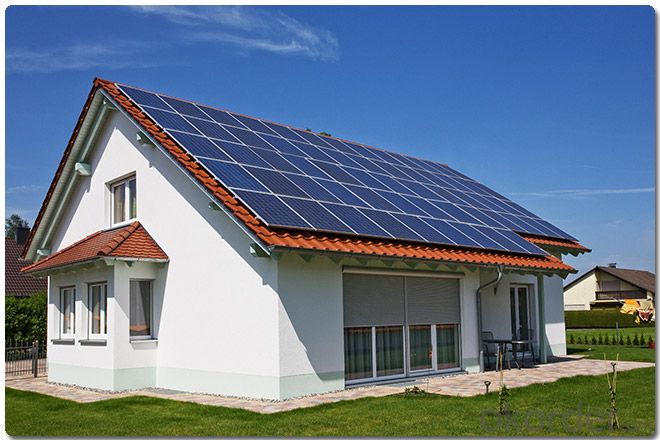
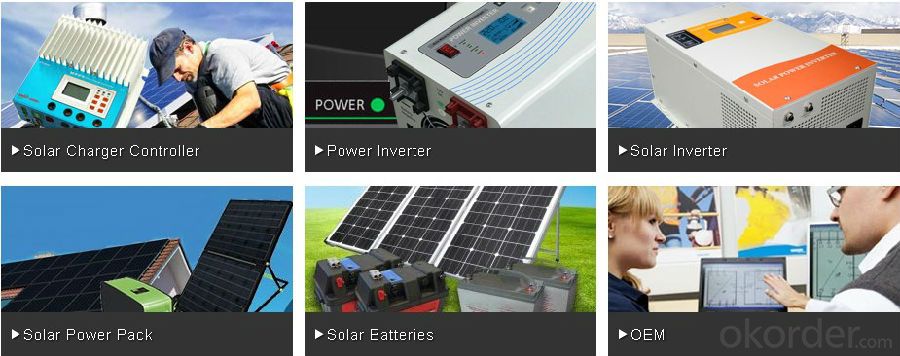
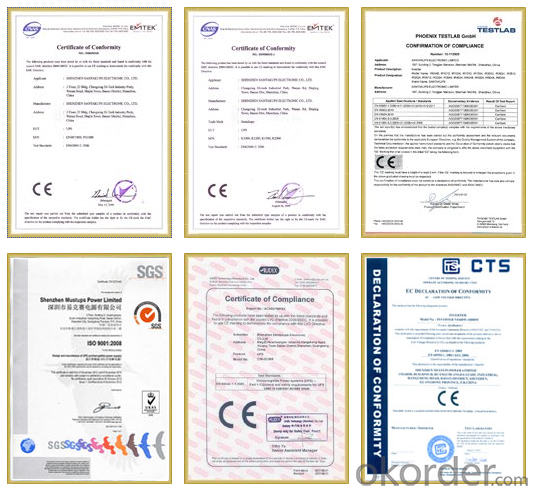
Warrenty
provides a 1~3 year limited warranty (“Warranty”) against defects in materials and workmanship for its Uninterruptible power supply, Power inverter/chargers, Solar charge controllers, Battery Products (“Product”).
The term of this Warranty begins on the Product(s) initial purchase date, or the date of receipt of the Product(s) by the end user, whichever is later. This must be indicated on the invoice, bill of sale, and/or warranty registration card submitted to MUST-Solar. This Warranty applies to the original MUST-Solar Product purchaser, and is transferable only if the Product remains installed in the original use location.
FAQ
1. How do I decide which system is right for me ?
For protection from long outages, include a generator or solar panels in your Must solar system. Shorter outages can be handled by a battery-only system.
2. Where my system will be installed ?
Must solar systems are usually wall-mounted near a home's main electrical (circuit breaker) panel.
3. How do I install my system ?
A must solar backup inverter is connected to a home electric system , we will supply detailed installation manual and videos for our customers .
- Q: Can a solar inverter be used with different types of tracking systems?
- Yes, a solar inverter can be used with different types of tracking systems. The function of a solar inverter is to convert the DC (direct current) generated by the solar panels into AC (alternating current) that can be used to power electrical devices. As long as the tracking system is capable of generating DC power from the solar panels, the solar inverter can be used to convert it into usable AC power.
- Q: Can a solar inverter be controlled remotely?
- Indeed, remote control of a solar inverter is possible. Numerous contemporary solar inverters are furnished with integrated communication capabilities like Wi-Fi or Ethernet connectivity, granting the ability to monitor and control them from a distance. Users can access and manage their solar inverters from any location with an internet connection through a web-based interface or a dedicated mobile app. The remote control features typically encompass performance monitoring, settings adjustment, and issue troubleshooting. This remote control functionality provides solar system owners with convenience and flexibility, empowering them to maximize energy production and efficiently manage their systems.
- Q: How does a grid-tied solar inverter function?
- A grid-tied solar inverter functions by converting the DC (direct current) electricity generated by solar panels into AC (alternating current) electricity that can be used to power homes or businesses. It synchronizes the AC electricity produced by the solar panels with the utility grid, allowing excess energy to be fed back into the grid for credit or compensation. The inverter also ensures the safety of the grid by continuously monitoring the voltage and frequency of the electricity produced.
- Q: What is the role of a maximum power point tracker (MPPT) in a solar inverter?
- The role of a maximum power point tracker (MPPT) in a solar inverter is to optimize the efficiency and power output of a solar panel system. Solar panels generate direct current (DC) electricity, but most appliances and the electrical grid operate on alternating current (AC). The MPPT is responsible for continuously adjusting the operating conditions of the solar panels to extract the maximum power available from the sunlight. It tracks the maximum power point (MPP) at which the solar panels can generate the most electricity efficiently. This is important because the output of a solar panel is highly dependent on factors such as temperature, shading, and the angle of the sun. By continuously monitoring and adjusting the voltage and current of the solar panel system, the MPPT ensures that the solar panels are always operating at the MPP, maximizing the power output. It achieves this by dynamically changing the electrical load on the solar panels to find the optimal operating point. The MPPT also acts as a converter, transforming the DC power generated by the solar panels into the AC power required for use by appliances or for feeding back into the electrical grid. This conversion process involves transforming the voltage and frequency of the electricity to match the requirements of the appliances or the grid. Overall, the role of a maximum power point tracker in a solar inverter is to optimize the efficiency and power output of the solar panel system, ensuring that the maximum amount of energy is harnessed from the sunlight and effectively utilized for various applications.
- Q: How does a solar inverter handle voltage sag or drop in the grid?
- A solar inverter handles voltage sag or drop in the grid by continuously monitoring the grid voltage. When it detects a voltage sag or drop, the inverter quickly adjusts its output voltage to compensate for the fluctuation, ensuring a stable and consistent power supply. This is achieved by utilizing the inverter's control algorithms and power electronics to regulate the output voltage and maintain grid compatibility.
- Q: Can a solar inverter be used with a solar-powered vehicle?
- Yes, a solar inverter can be used with a solar-powered vehicle. A solar inverter is used to convert the direct current (DC) produced by solar panels into alternating current (AC) that can be used to power various electrical components of a vehicle. In a solar-powered vehicle, the solar panels generate DC electricity, which is then converted by the solar inverter into AC electricity to charge the vehicle's battery or power its electrical systems.
- Q: How does a solar inverter handle voltage dips or surges in the grid?
- A solar inverter handles voltage dips or surges in the grid by continuously monitoring the grid voltage. When a voltage dip occurs, the inverter adjusts its output voltage accordingly to maintain a stable power supply. In case of a voltage surge, the inverter's protective mechanisms activate to prevent any damage to the system. Overall, the solar inverter plays a crucial role in regulating and stabilizing the voltage from the grid to ensure efficient and safe operation of the solar power system.
- Q: Can a solar inverter be used with a solar-powered telecommunications system?
- Yes, a solar inverter can be used with a solar-powered telecommunications system. A solar inverter is responsible for converting the direct current (DC) generated by solar panels into alternating current (AC) that can be used to power electrical devices. In the case of a solar-powered telecommunications system, the solar inverter would convert the DC power generated by the solar panels into AC power to effectively operate the telecommunication equipment.
- Q: Can a solar inverter be installed indoors?
- Yes, a solar inverter can be installed indoors.
- Q: How do you calculate the maximum power point voltage for a solar inverter?
- To calculate the maximum power point voltage for a solar inverter, you need to determine the voltage at which the solar panels generate the maximum power output. This is done by varying the load resistance and measuring the corresponding power output. The maximum power point voltage is the voltage at which the power output is highest.
Send your message to us
Solar Inverter Fault Codes Low Frequency Pure Sine Wave Inverter EP2000 Series 300W/400W Reliable
- Loading Port:
- Ningbo
- Payment Terms:
- TT or LC
- Min Order Qty:
- 50 unit
- Supply Capability:
- 1000 unit/month
OKorder Service Pledge
OKorder Financial Service
Similar products
Hot products
Hot Searches
Related keywords
